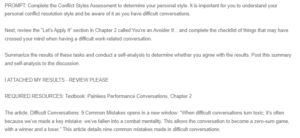Discussion – Personal Conflict Resolution Style
According to Madalina (2016), conflict management focuses on planning measures to avoid a conflict and taking effective and rapid measures when a conflict arises (p. 809). Conflict management styles are the strategies or approaches that can be used to make a conflict less complicated for individuals to handle (Chinyere, 2018, p. 26). The main conflict management styles include problem-solving, compromising, competing, accommodating, and avoiding. Our assignment help will hone your writing prowess for papers that will awe your professors.
Self Analysis
The results of the Conflict Styles Assessment indicated that I am 100% problem solver, 64% compromiser, 50% competer, 29% accommodator, and 17% avoider. Further, completing the checklist provided by Green (2013) on the common avoidance tactics that people use and how they affect management and work success confirmed the results of the conflict styles assessment by helping me realize that I focus on expressing my opinions and understanding other people’s views when having difficult work-related conversations (p. 34).
I agree with the results in the two tasks because I embrace teamwork when addressing a problem to ensure that everyone’s opinion is considered when making the final decision to get a mutually beneficial outcome. I also try to avoid having a combat mentality when solving a conflict to create a conducive environment for conflict management. According to Carmichael (2017), a combat mentality makes everyone in the conversation look bad, leading to a situation where everyone loses (p. 1). The primary strategy that I use to avoid having a combat mentality is compromising.
Moreover, the main goal of compromising is to get a partially win and partially lose situation (Tabassi et al., 2017, p. 42). The main factor that influences my decision to compromise in conflict management is my principle of prioritizing other people’s needs over mine. Zakaria & Lazim (2018) argue that collectivists prefer compromising conflict management styles while individualists prefer avoiding and competing styles (p. 23). Therefore, being a collectivist creates the foundation for my conflict management style when handling difficult situations.
References
Carmichael, S. (2017, May 2). Difficult conversations: 9 common mistakes. Harvard Business Review. https://hbr.org/2010/10/difficult-conversations-9-common-mistakes
Chinyere, A. N. (2018). Conflict management styles: historical evolution, perspectives, and rationalisation. Arabian Group of Journals, 7(1), 26. https://doi.org/https://www.researchgate.net/publication/339663743_CONFLICT_MANAGEMENT_STYLES_HISTORICAL_EVOLUTION_PERSPECTIVES_AND_RATIONALISATION
Green, M. E. (2013). Painless performance conversations: A practical approach to critical day-to-day workplace discussions.
Madalina, O. (2016). Conflict management, a new challenge. Procedia Economics and Finance, 39, 807–814. https://doi.org/10.1016/s2212-5671 (16)30255-6
Tabassi, A. A., Bryde, D. J., Abdullah, A., & Argyropoulou, M. (2017). Conflict management style of team leaders in multi-cultural work environment in the construction industry. Procedia Computer Science, 121, 41–46. https://doi.org/10.1016/j.procs.2017.11.007
Zakaria, S. M., & Lazim, N. (2018). The practices of conflict management styles from different perspectives. Jurnal Psikologi Malaysia, 32(4), 23. https://doi.org/chrome-extension://efaidnbmnnnibpcajpcglclefindmkaj/http://journalarticle.ukm.my/14955/1/441-1692-1-SM.pdf
ORDER A PLAGIARISM-FREE PAPER HERE
We’ll write everything from scratch
Question

Discussion – Personal Conflict Resolution Style
PROMPT: Complete the Conflict Styles Assessment to determine your personal style. It is important for you to understand your personal conflict resolution style and be aware of it as you have difficult conversations.
Next, review the “Let’s Apply It” section in Chapter 2 called You’re an Avoider If… and complete the checklist of things that may have crossed your mind when having a difficult work-related conversation.
Summarize the results of these tasks and conduct a self-analysis to determine whether you agree with the results. Post this summary and self-analysis to the discussion.
I ATTACHED MY RESULTS – REVIEW PLEASE
REQUIRED RESOURCES: Textbook: Painless Performance Conversations, Chapter 2
The article: Difficult Conversations: 9 Common Mistakes opens in a new window: “When difficult conversations turn toxic, it’s often because we’ve made a key mistake: we’ve fallen into a combat mentality. This allows the conversation to become a zero-sum game, with a winner and a loser.” This article details nine common mistakes made in difficult conversations.
link: https://hbr.org/2010/10/difficult-conversations-9-common-mistakes

